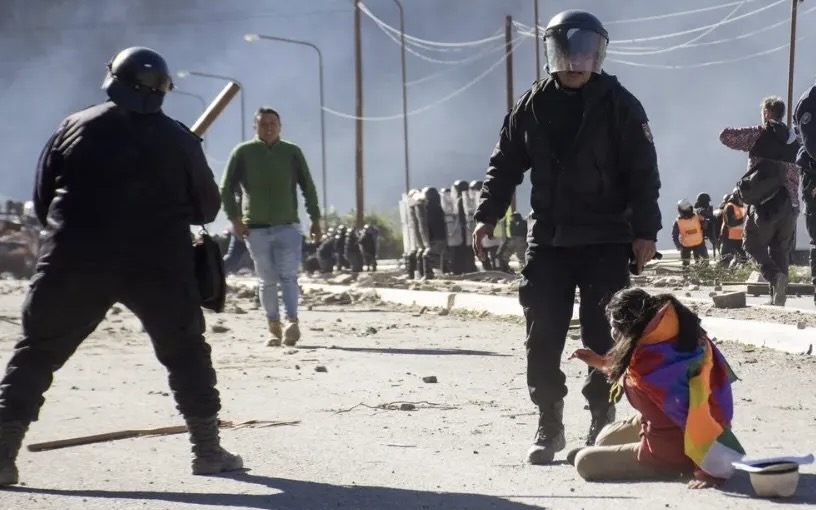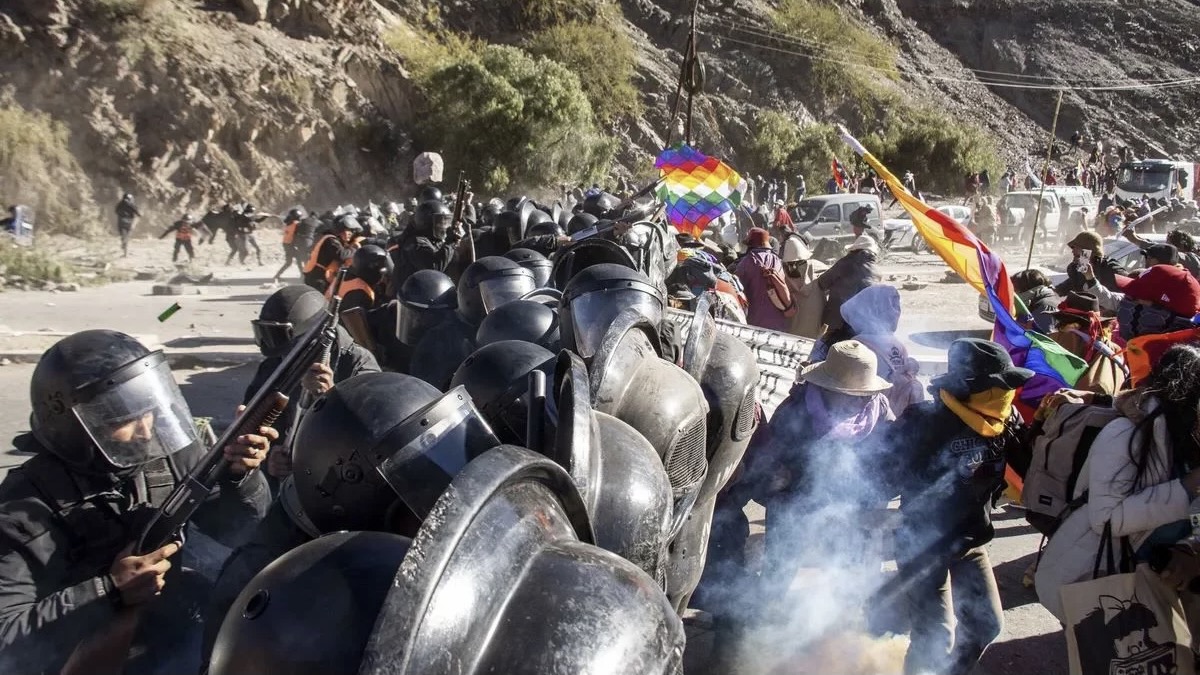In Jujuy, Argentina, communities and organizations have been mobilizing on the streets and highways to reject the constitutional reform that was pushed through an early approval by the provincial government of conservative Gerardo Morales in the early morning of Friday June 16. The massive protests in cities and towns across the province, which have seen participation from Indigenous communities, trade unions, and social movements, have been met with heavy repression from state forces.
On Saturday June 17 in Purmamarca, Jujuy, police cracked down on the blockade of Highway 9 organized by Indigenous communities and social movements since early Friday. Dozens were injured by the attacks with tear gas, rubber bullets, and batons, and police also detained 30 protesters. 17-year-old Mijael Lian Lamas lost one of his eyes after being shot in the eye with a rubber bullet.

The National Secretary of Human Rights, Horacio Pietragalla Corti, traveled to the province on Sunday to verify the situation on the ground and has called on the governor to sit down and dialogue with the different social sectors who have taken to the streets and insisted he abandon his “capricious” position. Pietragalla expressed concern that if the provincial authorities do not take measures to address the grievances raised by the communities, the situation could get worse.
The express approval of the reform takes place in the midst of a context of great social unrest in the province governed by the right-wing Radical Civic Union party under Morales. Teachers in the province are currently on week two of a strike organized by the Association of Provincial Educators (ADEP) and Center of Middle and High School Teachers (CEDEMS) to demand salary increases. Following the announcement of the constitutional reforms last week, trade unions, Indigenous organizations, and other progressive organizations had called for a day long general strike across the province on Friday June 16 to voice their opposition.
On the night of Thursday June 15, while legislators in the Constitutional Convention were voting, thousands were marching on the streets of the capital with torches in opposition to the reforms and as part of the ongoing teachers’ strike.
Days before the reform was passed, the National Secretary of Human Rights, led by Pietragalla, released a communique on the situation of human rights in Jujuy, referring to the ongoing protests and the mass opposition to the proposed reform. The national body expressed concern over what it called a “serious setback in the rights of the people of Jujuy” and warned that “the consolidation of the authoritarian actions of the Morales government would represent a threat to the democratic system in the Argentine Republic.”
Constitutional reforms undermine rights
The reforms to the provincial constitution have galvanized widespread opposition from diverse social sectors who have united on the streets to demand Morales’ resignation and the reversal of the reform.
One of the major points of contention is the reform to Article 36 regarding the “right to private property”. The reform gives greater rights to property holders as it gives “rapid and expedited mechanisms and routes that protect private property and reestablish any alteration in the possession, use, and enjoyment of the assets in favor of the title holder.” It also paves the way for a law that determines conditions for eviction.
Many Indigenous communities have pointed out that despite being ancestral inhabitants, 90% of Indigenous communities lack property titles. They say that this reform empowers private landowners to evict them, especially in a context of increased disputes over land rights regarding the extraction of lithium by multinational corporations in the province. Jujuy is home to several lithium extraction projects such as the Cauchari-Olaroz project one of whose primary shareholders is the Canadian giant Lithium Americas as well as the Cauchari and Olaroz projects of Australian lithium company Lake Resources.
The other key point of the reform which has sparked mass opposition is the point called “Right to Social Peace and Democratic Peaceful Living” which incorporated into the constitution the “expressed prohibition of total road and highway blockades, as well as all other disruptions to the right to free circulation of inhabitants of the province and their legal consequences.” Organizations across the country have condemned this point as a serious threat to the right to protest and to the full guarantee of human rights.
National response
Despite attempts to crush the resistance to the reform, the heavy repression of protesters and the undemocratic nature of the reform has sparked a national response. On Monday June 19, the Association of State Workers (ATE) announced that they would hold a national strike on Thursday June 22 to demand Morales cease the repression against the people of Jujuy and reverse the constitutional reform.
In a statement, the national trade union wrote, “We urge the government of Jujuy to cease these attitudes and actions, which have nothing to do with the exercise of democracy, we demand the release of our unjustly detained comrades and we call for a strong National Strike to show our repudiation of this situation.”
Legislators from the national ruling party Frente de Todos (FdT), as well as trade union leaders and human rights defenders held a press conference in the capital Buenos Aires on Monday to express their rejection of the “brutal repression” of the protests in Jujuy and announced a mass mobilization outside the Jujuy Provincial House in the city on June 22.
Hugo Yasky, the Secretary General of the Workers’ Central Union (CTA) and a national deputy with FdT, said in the press conference that the reform goes against the National Constitution and warned that Jujuy is a test case of what “the right wing wants for Argentina”.
On June 19, Amnesty International, the Center for Legal and Social Studies (CELS), Association of Lawyers for Indigenous Law, the Foundation for the Development in Justice and Peace (FUNDAPAZ), along with several other human rights and jurist organizations in the country, issued a statement titled “We demand the suspension of the constitutional reform in Jujuy”.
Highlighting the multiple irregularities in the process from the procedural issues in the approval, exclusion of social sectors in the discussion, to the problems of “legality and legitimacy” of the reform, and the heavy repression of protests, the organizations say that the only measure to respond to the demands of the people and “ensure a necessary, obligatory, and participatory debate of all sectors of society in Jujuy” is for the Constitutional Convention and Governor Morales to suspect the reform.
The organizations declare that: “Moving forward with such a reform will inevitably lead to its immediate challenge in court, since several of its provisions contradict the National Constitution and international human rights treaties, which will compromise the responsibility of the Argentine State before the international system for the promotion and protection of human rights.”





